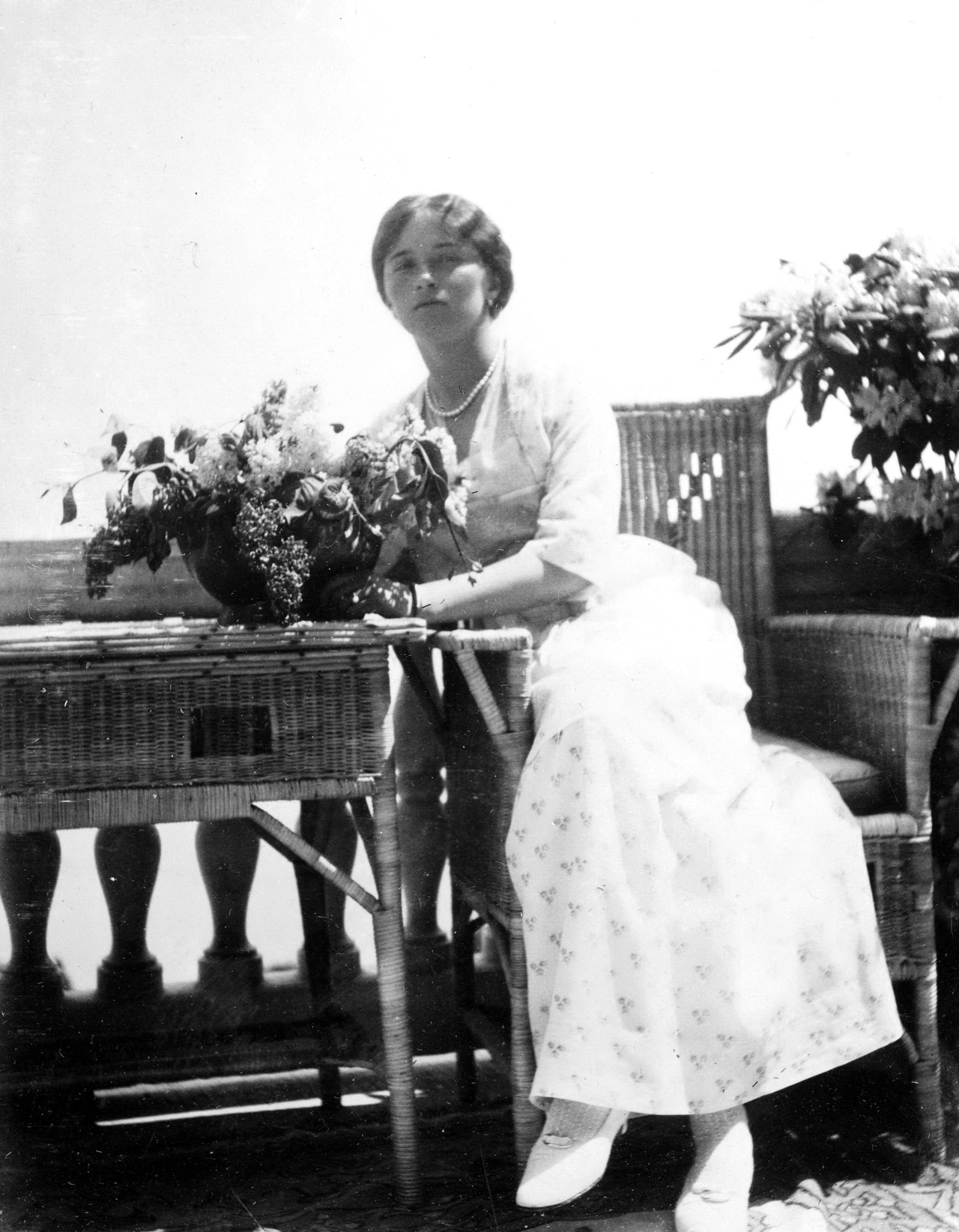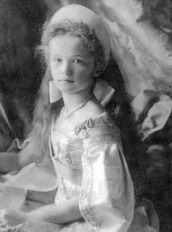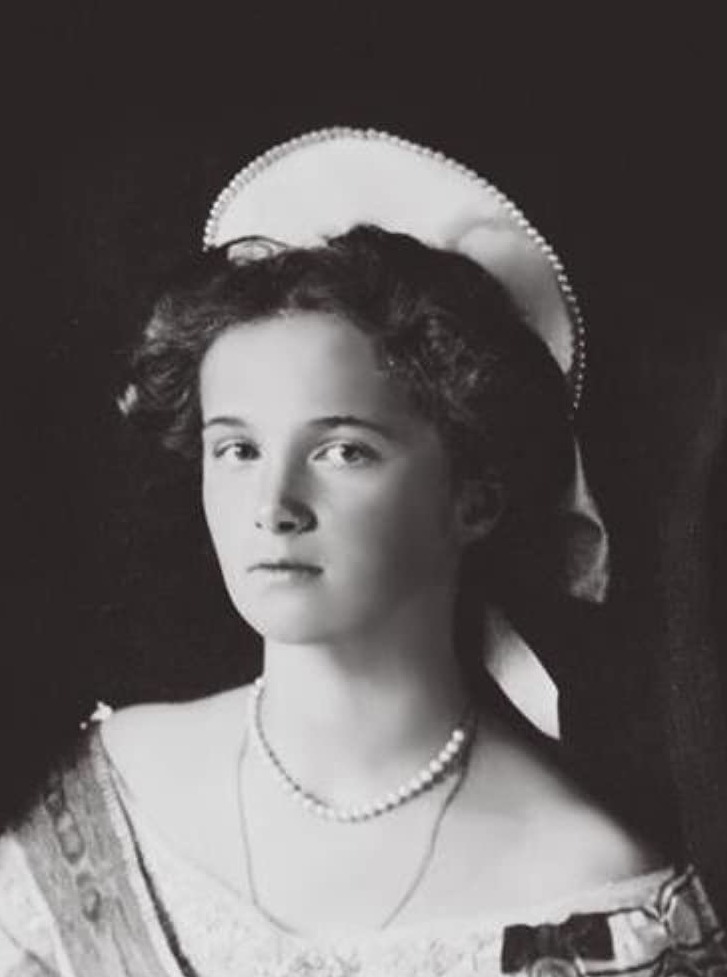
Olga in the Crimea, 1914

Olga in miniature court dress, taken for her brother Alexei's baptism
The tsar's eldest child, Grand Duchess Olga Nikolaevna Romanova was also perhaps the most relatable. She suffered from mood swings and laziness yet was genuinely charming, kind, and philanthropic.
On November 15 (November 3, by the Julian calendar), 1895, Grand Duchess Olga Nikolaevna Romanova was born, the first child of Nicholas II and Alexandra Feodorovna. Many Russians were disappointed she was not a boy as according to Romanov law only males could inherit the throne: "A great joy, although it's a pity it's not a son!" was Olga's aunt Xenia Alexandrovna's comment.¹ Nevertheless, the imperial couple was ecstatic: "For us there is no question of sex. Our child is simply a gift from God." They were still young, and there was still time for a male heir. For now they were content with Baby Olga, who was a "delightful little daughter," fat and bonny. Although some, such as Grand Duchess Maria Pavlovna the Younger, found Olga's large head made her look strange and ugly, her general reception was overwhelmingly positive. Visiting France, crowds cheered for her, and she even had a recipe, L'Olga, named for her. Visiting her great-grandmother, Queen Victoria, the reception was similar, and the queen adored the cherubic infant.¹
Even as a child, Olga’s markedly noble and kind heart shone. Once, when seeing a crying little girl on the road, Olga declared in distress that Santa Claus must have forgotten her and exclaimed, "Don't cry, little girl, here's a doll for you," and threw her a doll. Visiting a toy shop, she refused to take any but the smallest toy, despite the desperate efforts to beguile her into buying something more valuable. “But the beautiful toys belong to some other little girls, I am sure; and think how sad they would be if they came home and found we had taken them while they were out,” she protested. On the other hand, she could be impatient and willful, and utterly—sometimes unfortunately—candid. When she was forced to sit for hours on hours for a portrait, the tiny Olga naturally grew impatient, telling the artist, "You are a very ugly man, and I don't like you one bit!" He recoiled in shock, replying that “You are the first lady who has ever said I was ugly, and moreover, I’m not a man — I’m a gentleman!”¹³
Her kind and gentle nature remained throughout her life; when her cousin Kostya told her he intended to gift her a killed young deer, she wrote to her father of her bewilderment: what would she do with it? And why one so young?⁵ She set aside part of her allowance for treatment for a crippled girl who could not afford it, and her generosity was thought to be almost angelic, as any appeal to her was immediately received and answered. “Oh, one must help poor so-and-so. I must do it somehow,” she would say.¹⁶
But in adolescence her impatience and willfulness also remained. She had a "strong will,” and “sometimes showed herself ... disobedient," Anna Vryubova, Alexandra's close friend, noted.⁹ Her mood swings were profound—arguments with her mother were common—and her massages seemed to have little to no effect. "Olga is most unamiable about every proposition," her mother complained.¹ Although Olga’s relationship with Alexandra was complicated, she unreservedly and wholeheartedly adored her father, whom she referred to as her “Golden” or “Sunny Papa.”⁵ Olga was particularly close to her sister Tatiana; she and Olga were known within the family as "the big pair" or "the big ones". She was also close to her other three siblings, all vivacious and energetic: with Maria she wrote "mean verses,"¹⁰ with Anastasia she rode bikes in the palace,¹¹ and with Alexei, she struggled to restrain his boisterous nature but also took care of him as his oldest sister.¹

Olga in the Crimea, 1914

Olga in miniature court dress, taken for her brother Alexei's baptism
Although one might not expect such a moody person to be friendly, she was. Despite being profoundly introverted, she was also charming and amusing, much like her father. Unlike her sister, Tatiana, who had greater reserve, Olga had a carefree, although brusque,¹⁷ communication style. Amiable and charismatic, “people loved her from the moment they set eyes on her.”⁸ The outward lightness of heart, however, disguised the deep and philosophical nature hidden inside. With her "crystal soul," transparent, cordial, and frank,⁵ she was unafraid to express her opinions; this, coupled with her hot temper,¹⁶ meant conflict with her was not hard to attain.
Poetic and dreamy, Olga had a natural inclination to be romantic. She had three main crushes, although there were many more: Alexander Shevedov, Pavel Voronov, and Dmitri Shakh-Bagov. All of these were passionate and made even more so by Olga's teenage hormones. There was no future with these men, though. As a grand duchess, Olga was far above them in class, but she promptly rejected eligible men of her rank, instead clinging to Russia and Orthodoxy: "I am Russian, and mean to remain a Russian!" she insisted when Prince Carol of Romania was suggested for her.¹⁴
With her pretty mezzo-soprano voice, Olga was musical, but lacked the diligence of practice that characterized Tatiana. Instead, Olga played when the spirit moved her with an ear that was, teachers said, “absolutely correct.”¹⁶ Perhaps this was why she was so certain in criticizing her sisters’ playing: either “Tatiana is playing Fibich for our listening pleasure—which is very boring, or “Marie is … hitting a lot of wrong notes.”⁵ Neither was music her only talent: her graceful figure made her a beautiful rider and dancer, and she was generally agreed upon to be the most intelligent and studious among her siblings.¹⁶ Still, as she grew older her French tutor Pierre Gilliard noted that instead of making progress, she began to go back.¹⁴ Nor did her intellectual gifts endow her with utter seriousness in the schoolroom: she and Tatiana would maniacally run across the chairs as soon as the teacher left the room, then race back to their seats as the next teacher came in.¹⁶
Her appearance, although not classically beautiful, was irresistible in its charm with her smiling blue eyes, high cheekbones, and straight white teeth, which despite the gap in her front teeth, were still remarkable enough to be commented on by many. She had a short nose that she laughingly referred to as her “humble snub.” Her hair was fair and blonde, and darkened with age; standing at around five foot five, or around 165 centimeters, she was considered to be slightly taller than medium height.
Olga, of her siblings, was the most aware of the turmoil in Russia. She read the newspaper and talked with friends. "Why has the feeling in the country changed against my father?" she asked, but no one could give her a satisfactory answer. She was also the most aware of Rasputin's influence. Although she adored him like all her sisters, with no idea that he was a fraud, she remarked eerily that "Maybe it was necessary to kill him, but not so terribly," adding, "we are a family, one is ashamed to admit they are relatives." Among the killers were Dmitri Pavlovich, one of Olga's father's favorite cousins, who was even considered as a marriage candidate for her, and Felix Yusupov, Olga's cousin Princess Irina Alexandrovna's husband.⁵
When World War I broke out, Olga, Tatiana, and their mother became Red Cross nurses. Unlike Tatiana and Alexandra, however, Olga was not suited for the work. The gruesome natures of the surgeries and amputations caused a nervous collapse, and she began taking arsenic injections as treatment. She also stopped nursing. However, she continued to stay active on an administrative level and bandaged patients, enchanting them with her feminine charm.⁴ Patient Semyon Pavlov remembered that she had a gloriously kind heart and even that hypothetically in a crisis, he would approach her for assistance rather than her more reserved sister Tatiana.
Olga's dream was to marry and live in the countryside, with nothing of the court, and no even court officials.⁵ Unfortunately, the Russian Revolution caused Olga to sink deeper into depression when her family was first placed under house arrest and then sent to Siberia, in Tobolsk, and later on to the Ipatiev House in Yekaterinburg. Unlike her sisters, she did not like talking to the guards, and instead stayed off to the side, occupied with her brother.⁵ Even so, Olga still liked playing the piano, likely to relieve the boredom, choosing catchy and plaintive tunes, an echo of the whimsicality of her former self. But the monotony was not to last. In the early morning hours of July 17, 1918, after seventy eight days in Yekaterinburg, she and her family were led into the cellar of the Ipatiev House and killed with bullets and bayonets. Olga was only twenty-two years of age.

Father asks us to ...Remember that the evil which is now in the world will become stronger yet and that it is not evil which conquers evil, but love.¹
Olga Nikolaevna
1895-1918
Free AI Website Creator